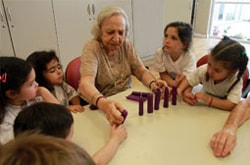
Lucrecia, a three-year resident of the LeDor VaDor senior complex in Buenos Aires, Argentina, garners strength from the weekly intergenerational activities with “her kids” at JDC’s Baby Help nursery and day care.
Rosana Jacofsky, a long-time teacher at the Joint Distribution Committee’s (JDC) Baby Help day care program in Buenos Aires, Argentina dedicates the majority of her time to children with physical and psychological difficulties. “We are constantly reminded that love can break through any barrier,” she says.
Watching her students interacting with the elderly residents of the LeDor VaDor senior complex, Jacofsky revels in the value, for all ages, of this intergenerational exchange. “I wish that every child would have a chance to experience something like this.”
JDC established the Baby Help program in Argentina in 2003 to provide vital services and Jewish connection for impoverished pregnant women and children (birth to five years) following the country’s devastating economic collapse. In addition to ensuring basic necessities such as food, milk, vitamins, vaccinations, and diapers, the Buenos Aires center offers day care so parents can find and maintain jobs, and welcomes dozens of young families for spirited celebrations of Shabbat and Jewish holidays throughout the year. Many of the families are single-parent households and many are troubled homes with serious social issues that take a toll on the children.
Through these social services and gatherings, Baby Help is instilling Jewish tradition and a sense of belonging among families who may otherwise feel estranged from the Jewish community. “The teachers and volunteers constantly transmit Jewish traditions and culture. Over 200 people regularly come to celebrate major holidays together,” adds Viviana Bendersky, Baby Help program director.
Attendance has soared since Baby Help recently began to organize joint activities for the kids with residents of the LeDor VaDor senior complex, where Baby Help is housed. For the elderly who share in activities such as arts and crafts, gardening, and Kabbalat Shabbat on Friday afternoons, these programs often improve their outlook on living in an old age home, making the space seem more like a family atmosphere.
Lucrecia, 89, has been a permanent resident of LeDor VaDor for three years. Despite her physical difficulties and needing to use a walker to get around, she comes to Baby Help every Friday to visit “her kids” (as she affectionately calls them). “I look forward to lighting the candles, singing together, and cutting the challah bread. It reminds me of when I was a child!” Lucrecia’s caretakers observe how uplifting these intergenerational visits are for her. “We see her laugh out loud with the children, enjoy their company, flower them with kisses and hugs while singing songs.”
The children share in Lucrecia’s joy, benefitting from the extra love and attention while also learning about aging and people’s physical and other limitations. Over time they form loving bonds and reinforce one another’s emotional well-being.
Take 18-month-old Ezequiel S.: Born with a severe congenital spine malformation, Ezequiel has permanently impaired mobility and extreme urinary tract complications. His parents, who struggle to make ends meet on their meager earnings as school teachers, feared they would need to quit working in order to meet his special needs.
Desperate to find a loving and healthy environment for their son, Ezequiel’s parents brought him to Baby Help last year. The caretakers were able to provide him with the specialized medical and educational attention he needed, enabling his parents to keep their jobs and support the family. Today, Ezequiel is a happy baby boy, curious to learn about his surroundings and excited to engage with the elderly visitors who add warmth to his environment.
Ezequiel’s “Mora” (teacher) Rosana Jacofsky, treasures these intergenerational programs as much as he and Lucrecia do. “Every time I see an elderly resident’s face light up, I’m filled with emotion and pride. The seniors thank us profusely; they want to know about the kids that they play with and are filled with love and life when they share time together,” says Jacofsky. “The intergenerational bonds are really something special: hugs, smiles, and unspoken gestures are a common language here.”
The programs of the Joint Distribution Committee, like the Argentine Baby Help, are funded in part by the generosity of the Tidewater Jewish community through gifts to the UJFT’s annual campaign. Every dollar raised makes a significant difference to real people like Ezequiel—at home, in Israel, and in 70 countries around the world. To make a gift, visit Jewishva.org.
Read other UJFT success stories. Learn more about the UJFT and what we do.
